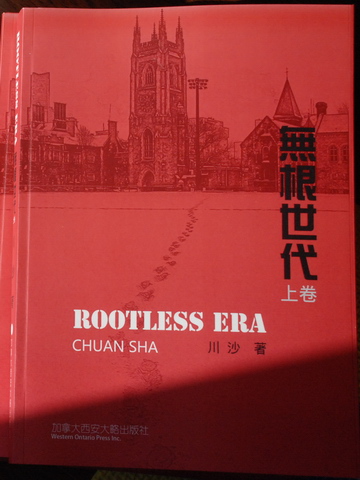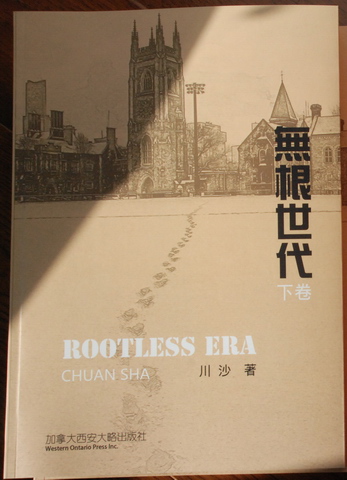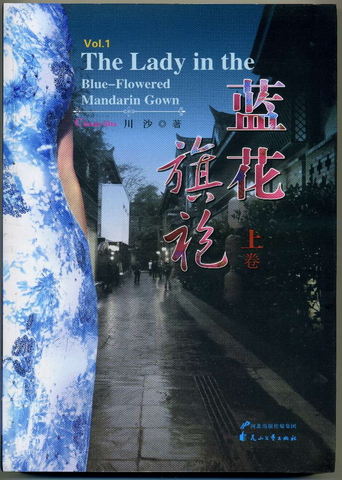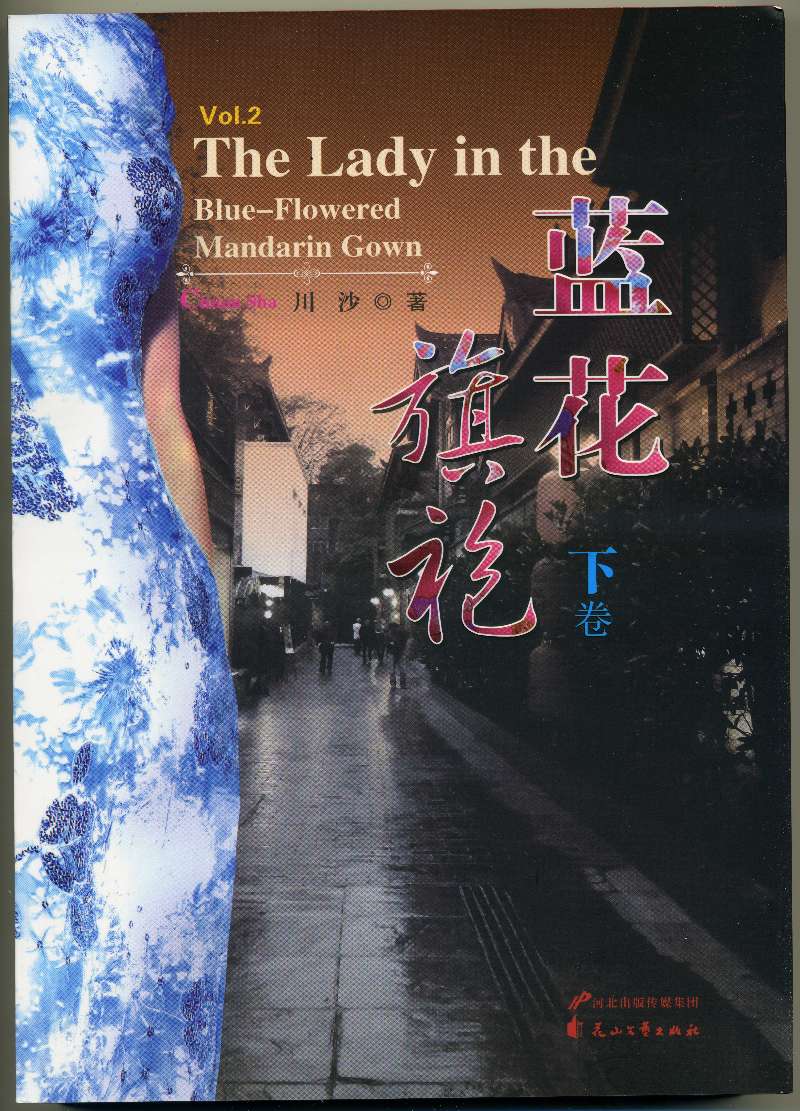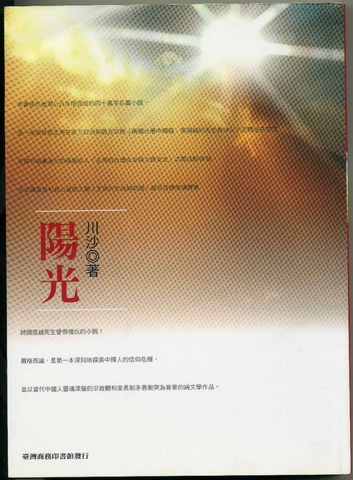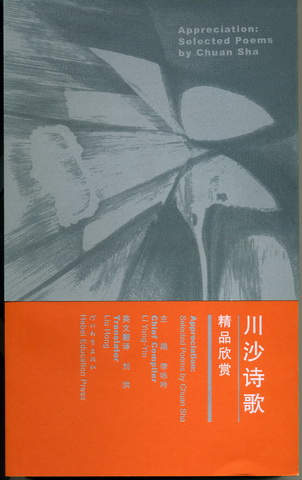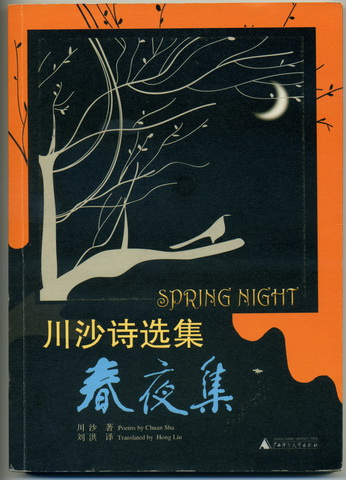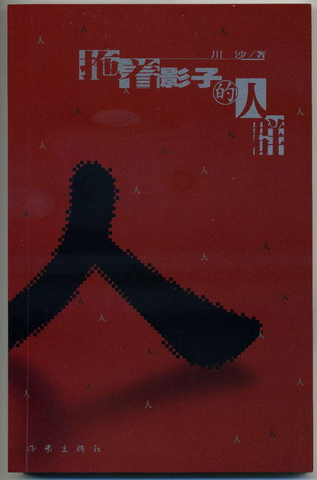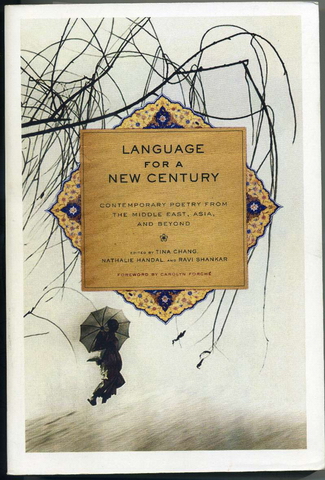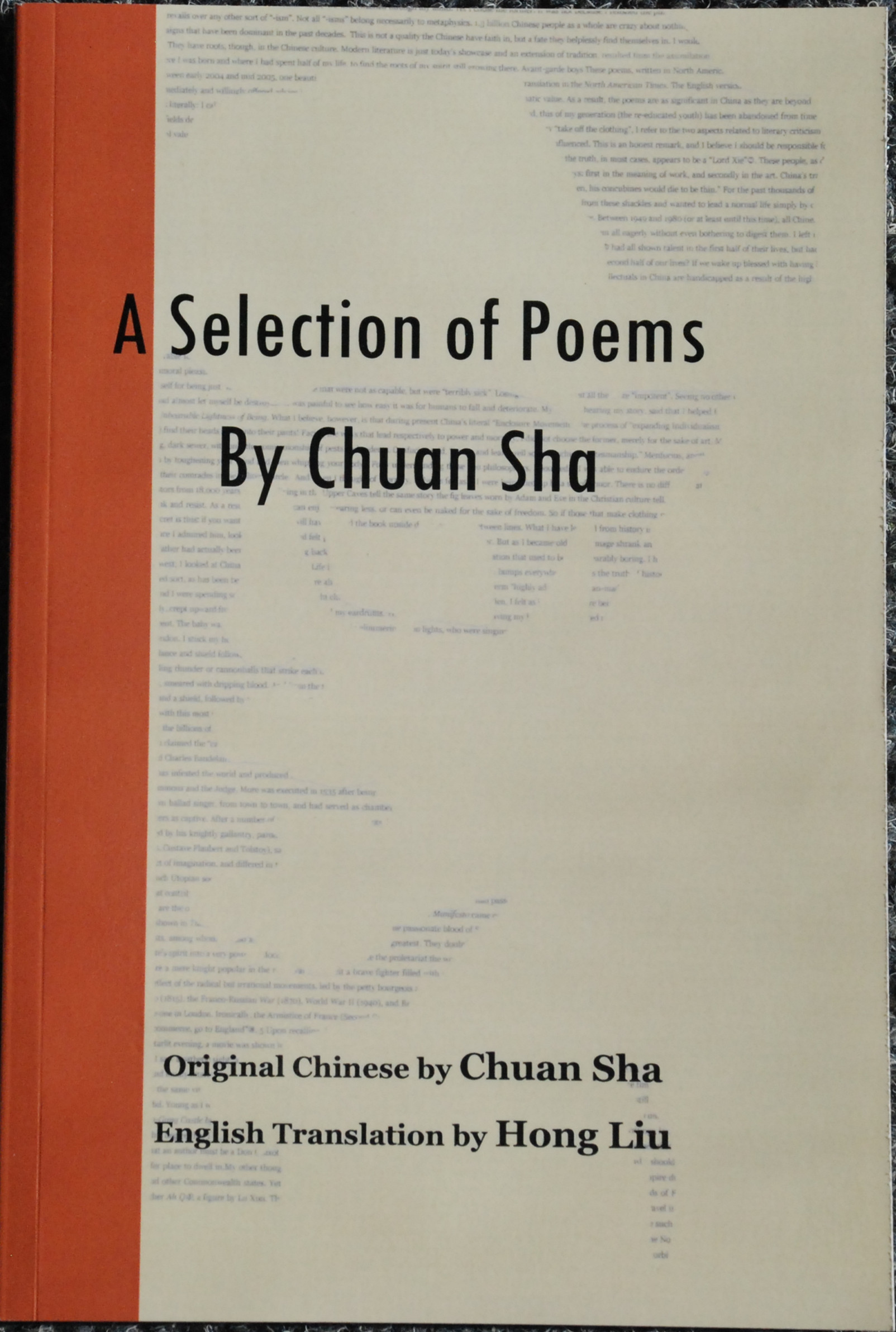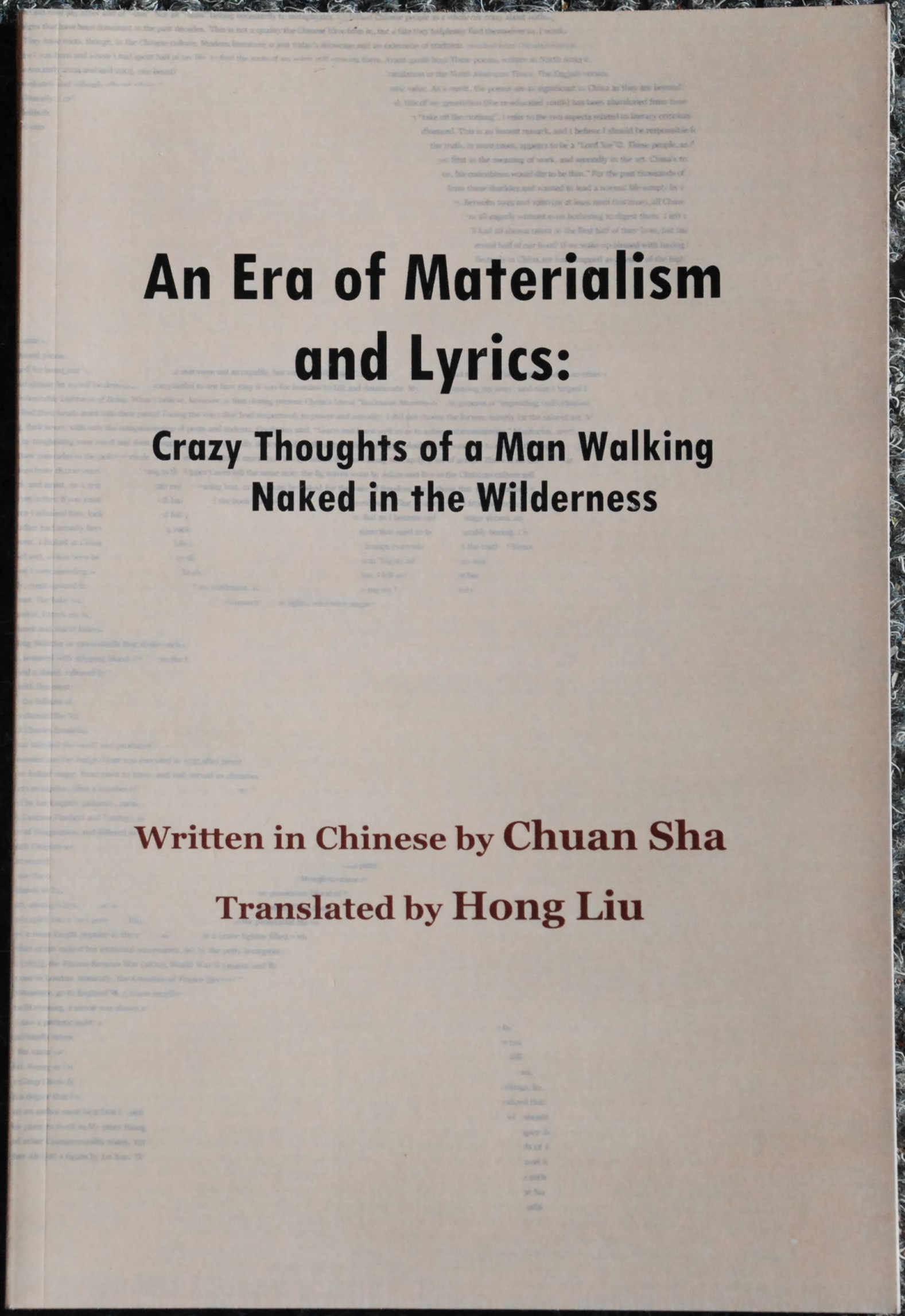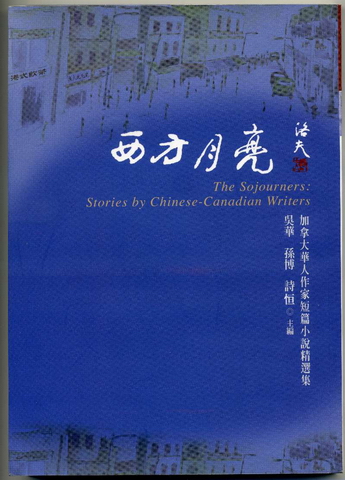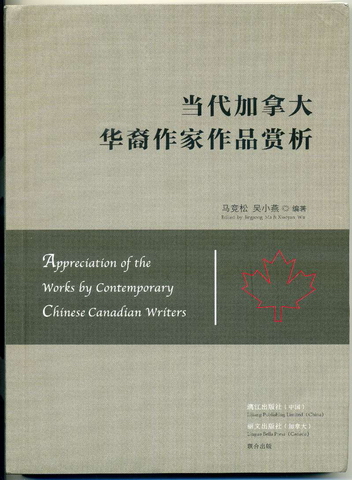(12)河岸边那些卵石
1988年春 海南岛 三亚
春天
燃烧着的雪消溶
山崖上缄默的巉石从酣眠中醒来
畅饮河风的料峭和水腥
绽出梦中的苔藓
那些暗绿色的
苦涩的苔藓
赤脚丫的孩子们在沙滩奔跑着嬉闹
凄冷的老人胸脯上
吸取着少妇嘴唇的温暖
一行行脚印
孩子们的
沙滩上的
空灵的脚印
无比的爱怜、
陌生、
脆弱……
白胸脯的燕子
在河上飞来飞去
吱吱地欢唱
撩开阴郁的薄莎
把那些孤独的卧榻、
黎黑的额头
骄矜的泪窑
从冬天污涩的水洼里衔来
扔进湍急的河流
一个个白昼、暗夜
哗啦啦地流去
只有
河岸边那些卵石
从蹲伏的老房子里
睁大盲瞽的眼睛
探出
弯曲的
缠绕着无数死结的
连接自远古某个黄昏的视线
看着这个世界
清新的世界
听着汨汨的满江春水
发出悲哀的叹息
思念那些突兀的世纪,
嬗替的岁月
牢牢地蹲伏在峭壁上
历经苍海桑田
在河底
和一簇簇蔓藤、根须、锚链扭绞、挣扎
──顺水漂走的
手和足、还有翅膀
─ 片片耀耀闪光的彩色羽毛
在深水里
看着一个个鬈发绿太阳
龇牙裂嘴的青光月亮
蜕化了的眼睛
和那颗
曾经按自己的脉律
搏跳的心儿
现在只能在
晃来晃去脚踵后面
呻吟的
心儿
想起
有一年
溽暑的一天
发大水时
那艘占着河道不让的
老掉牙的轮船在它们头上行驶时
被湍急的江流冲翻的情景
起初轮船鸣鸣吐着黑烟逆流而上
后来一阵急流将它冲翻
船头瞬间倒插向河底的暗流
满江的人在水上漂
一刹那上百道绝望的灵光射向天际
在苍穹下凄惨地飞翔
被一阵狂风吹散
弥漫于苍白的高天
那些或长或短的文章
或悲或喜或壮或平乏的故事
都在那儿注了最后一个标点
无论是惊叹号、问号、还是省略符号
都在那儿成了句号
攸攸地
滚圆滚圆
旋转的灵魂
水泡似地闪动着弦光
吐出最后的气息
溶在浪花上
破灭在天水间
天陲消失
天国降临
后来
满江的尸体顺水漂流
展开一长卷讣告
几个想当骑士的
上岸后也失去了手足
称得上游水健将的几个
上岸后也捶胸顿足
叹息那些人的苦命
诅咒那占着航道不让的
老掉牙的轮船
诅咒那千百年咆哮的江流
现在
经过冬天
江水复归平静、
鸭绿青青
像波丝猫的眼睛
河岸边那些卵石
听着江上鸣鸣寒风中叮叮的铃声
看着袅袅升腾的黑烟下
那艘风蚀残年的轮船
那些
站在起锚的船头铁栏杆旁
默默伫立的
老人、小孩、男人、女人
花瓣儿似的
多么脆弱、多么清新的
眼睛
还有那些
长满暗绿色的
苦涩苔藓的
缄默的巉石
在沙滩上赤脚丫奔跑着的孩子们
吱吱欢唱的
在河上飞来飞去的
白胸脯的燕子
看着这些
河岸边那些卵石
想着已经顺水漂走的
手和足,还有翅膀
─一一片片耀耀闪光的彩色的羽毛
还有一颗颗
按自己脉律
搏跳的心儿
心里
涌起了阵阵的
早春的
悲哀。
-
Pebbles on the riverbank
Spring 1988, San-ya, Hainan Province
Spring steals in
To melt the snow that seems to be burning atop
The mass of silent dark rocks that awake from slumber
To feel the cutting of the wind and smell of the river
While upon them moss starts growing
The dark green
Bitter-tasting moss
Barefooted children run along the beach laughing
The old folks feel their cold chests
Warmed as if by being kissed by a young woman’s lips
The trails of footprints
Of the children
Along the sand
Seem hollow
Look pitiable
Strange and fragile
Trails no one can tell…
The white-breasted swallow flits
Over the river
Twittering, happy to
Unveil the gloom
So that the lonely beds
The gravely colored foreheads
The sentimental pouches
Will be taken away from the stagnant wintry pools
And thrown into the river
That flushes forward with days
And nights
Only
The pebbles by the river
And by the old houses
Open their nearsighted eyes
The pebbles’ eyesight is curved
Tangled with countless unsolvable knots
Connected to a certain late afternoon of
A thousand years ago
Yet they look around
At the ever-changing world
And listen to the running spring water
And utter a sad sound
They recall the past
Of many centuries
When they stuck themselves on the cliff
To feel the passing of time
And on the bottom of the river
Struggled with roots, hairy strings, and anchor chains
Before their eyes were
Hands and feet, and wings
–And feathers with colors and light.
They had seen the mossy green hair of the sun
And a green-lit moon showing its teeth
And a pair of eroded eyes, and
The hearts that used to
Beat their own pulse
The pebbles can only now
Groan as the heels descend
Moving right
In the front
It occurs to them that
One summer day of
Who knows what year it was
There was a flood
That overthrew an old ship which
Had occupied the riverbed for ages
Right over their heads
The steamer gasped puffing black smoke against the current
When it was turned over by a torrent of waves
Its bow planting itself upon the riverbed
People floated on the river
And a hundred soul lights flew towards the sky
Flying with the sound of grief
Blown apart in gusts of wind
Into pieces that made the sky sickly white
Then came the writings of all lengths
With stories with sad, happy, dull, exciting themes
All ending with punctuation marks
Exclamations, question marks, an ellipsis
Replaced by a full stop
Slowly taking its time
The fully round soul
Swirling
Like a colored bubble
Puffing its last breath
Into a wave
Popping into drops under the sky
The horizon disappears to make way
For the kingdom
Until later
The corpses came in the flow of
The river as in the long list of obituaries
Survivors who once dreamed to be knights
Found themselves losing limbs,
And previously excellent swimmers
Beat their chests and stamped their feet
Crying for their dead brothers
They cursed the old ship that used
To occupy the river and they
Cursed the river that had been roaring by since forever
For the moment
The winter is gone
The river again becomes calm
And green like the eyes of a Persian cat
The pebbles along the riverbank heard
The bell ringing in the wind
And saw the aged ship motionless
In the background of the curling black smoke
Beside the rail of the unanchored ship
Were the old people, children, men and women
Standing, wordless,
Watching with timid
Fragile yet fresh
Eyes
The dark green moss, bitter
Unnoticeably
Began to crawl over
The mass of silent rocks
Like the barefooted children running along the sand
Trying to catch the
White-breasted swallows that flew
Singing around the beach
At the sight of this
The riverbank pebbles cannot help but
Think of hands and feet, and wings too,
Rushed away downstream
Wings with colored feathers
They think of those hearts
That beat their
Own pulses
There arises a feeling
A touch of sadness
In their hearts
That smelled of spring
[12]草树知春不久归
张 杨
萧索单调的冬季里,我们总是在盼望春天,盼望她的万物复苏、情意绵绵和悠然自得。古代就有许多赞叹春天的诗句,如:“草树知春不久归,百般红紫斗芳菲。”(韩愈《晚春》)“等闲识得东风面,万紫千红总是春。”(宋·朱熹《春日》)。川沙先生的这首《河岸边那些卵石》,却一转文人惯有的对春天的感受,以探索生命的视角,将早春的欢乐与悲哀融为一体,凸显了生命的终结给人们带来的不可磨灭的记忆。整首诗空灵、宁静、舒展、智性又带有伤感悲情,是一篇不可多得的佳作。
在川沙先生看来,春天里有欢乐,也有伤感。全诗有八个小节,前两节诗人采用了大自然中几个常见的意象描绘出一幅海南春景图(这首诗作于中国海南):万物从寒冬中苏醒过来,“燃烧着的雪”消融,“缄默的岩石”从酣眠中醒来,“暗绿色的苦涩的苔藓”从梦中绽放出来。同样的,沙滩上也充满了欢声笑语:孩子们在奔跑嬉闹,老人享受着温暖,沙滩上的燕子在空中自由地飞翔,一切都显得那么宁静,使人情不自禁地沉浸在这幅画面中。其中最引人注目的是作者在诗中写到的“一行行孩子们在沙滩上留下的空灵的脚印”, 尤其是“空灵”二字将宁静温馨的情意淋漓尽致的表达出来,空灵的脚印使我们不禁会联想起孩子们的嬉笑,父母对孩子的守护,子女对老人的陪伴的身影,这与中国现代诗人卞之琳的笔下的“白螺壳”有异曲同工之妙:空灵的白螺壳,你,孔眼里不留纤尘,漏到了我的手里却有一千种感情:掌心里波涛汹涌,我感叹你的神工,你的慧心啊,大海,你细到可以穿珠!……
再回到川沙先生的诗当中,面对冬天的孤独与阴冷,人们潇洒地“从冬天的水洼里衔来,仍进湍急的河流…… 哗啦啦地流去。”在他们的记忆里不会给这些记忆留下空间,过去了便过去了,一切都恢复了平静。然而,从诗的第二节末尾“只有–”二字开始到第六节,平缓的节奏顿时变的紧张起来,在欢乐景象的背后有一些河岸边的卵石开始发出阵阵的悲叹。有些河岸边的卵石开始“思念着突兀的世纪”;有些河底的卵石正回忆着曾经目睹过的轮船失事事件,回忆着那些“顺水漂流的手和足,还有翅膀”;还有些在深水里触摸不着春天气息的卵石,在它们眼中赋予大地生命的太阳和美丽神奇的月亮也被扭曲了,成了“鬈发的绿太阳”和“龇牙咧嘴的青光月亮”,随着五六两节对失事轮船过程的回忆,从而将悲哀的感情推向了高潮:生命的终结意味着一切的结束!的确,生命一但结束,所有的欢乐、悲伤、忧愁也一并消失,一切都失去了意义。正如诗中所说:“那些或长或短的文章,或悲或壮或贫乏的故事,都在那儿注了最后一个标点。”这里诗人用借代的手法,用“惊叹号”、“问号”、“省略号”指代后来人们对轮船失事的种种反应,而“滚圆滚圆的句号”则标志着一切的终结。
一个小说家说川沙的诗带有一种情绪的错位,一点不错,但是我认为这种错位更加凸显了川沙先生的敏锐和一种客观的冷静。在嘈杂的世界中,作者用拟人的手法以河岸边的卵石为视角来观察世间的变化,面对冬去春来、生生死死的循环往复,它们无力改变只能默默注视,但是灾难、死亡却永远的留在了它们的记忆里,即便是春天来了,它们依然会回忆起这般伤感。一颗小小的卵石仿佛蕴含着整个世界,可以说达到了“一沙一世界,一花一天堂”的境界,也类似于诗人卞之琳在《圆宝盒》所写:一颗晶莹的水银掩有全世界的色相,一颗金黄的灯火,笼罩有一场华宴,一颗新鲜的雨点含有你昨夜的叹气。
川沙先生是个对生命的玄思者,他把对生命的感悟用一些普通的意象表达出来。常人往往会局限于自己的世界中,这个世界是由他们所经历的事件构成的。而诗人不同,诗人会带着特有的敏感和宽广的胸怀去看整个世界,川沙先生属于后者。在一个瞬间,他看到了欢乐,同时也看到了某个角落的忧愁,述说了生命的悲欢。当时还很年轻的川沙先生便是以一种整体的生命观来注视这个世界的,可以说心情超越了年龄,智慧超越了年龄!

